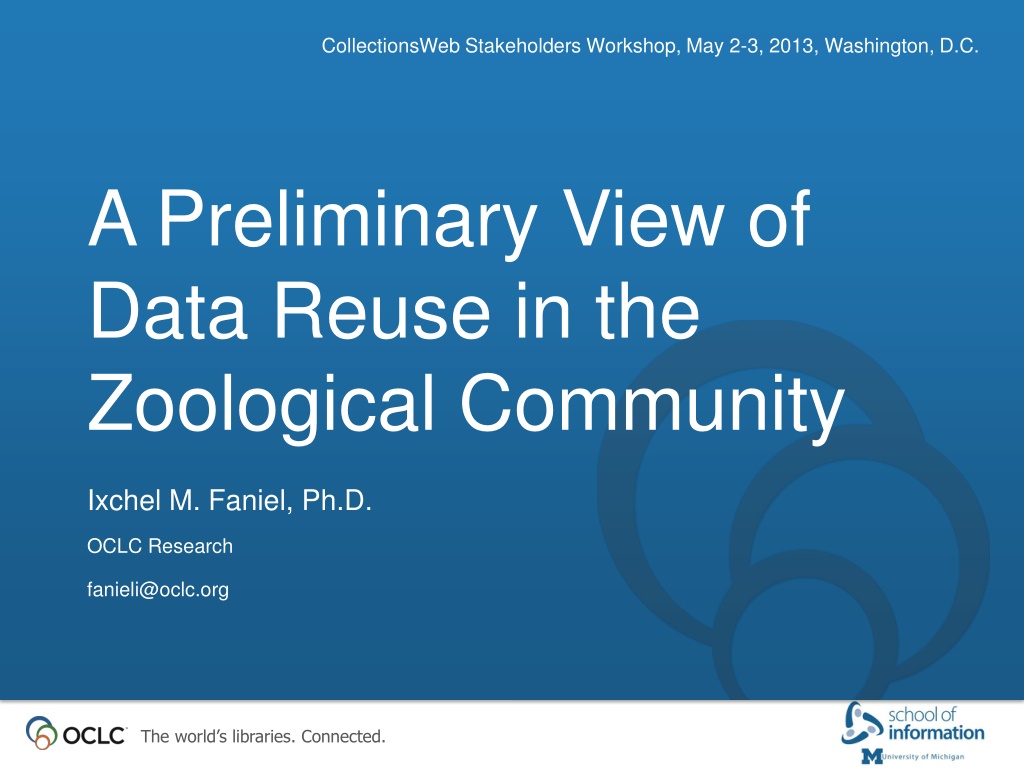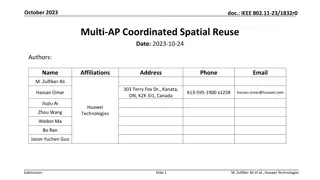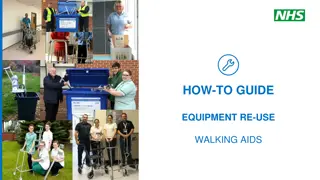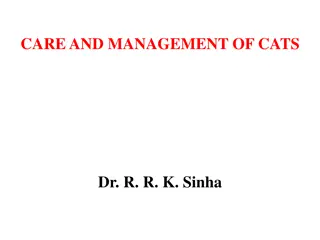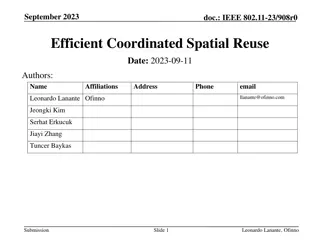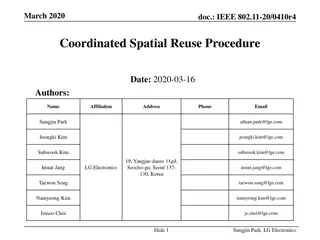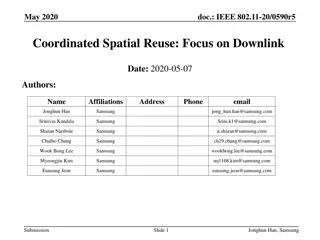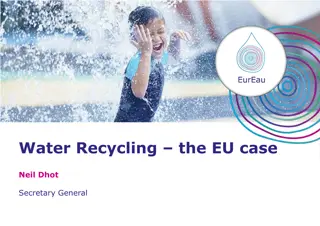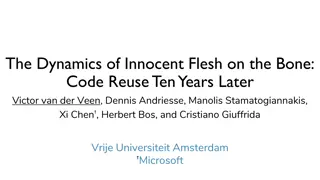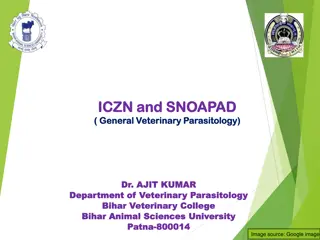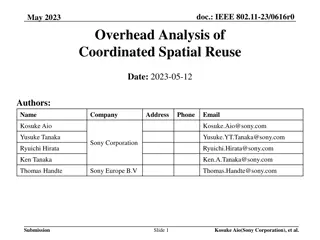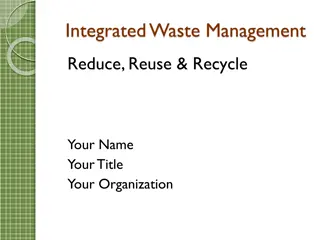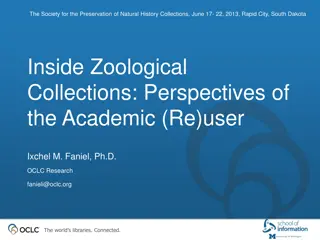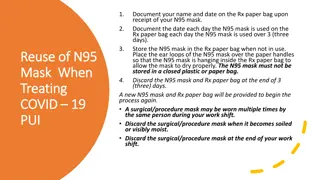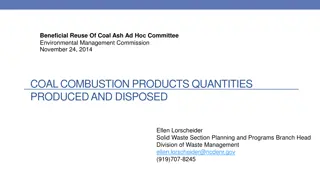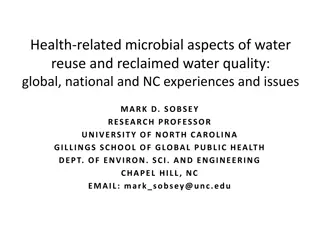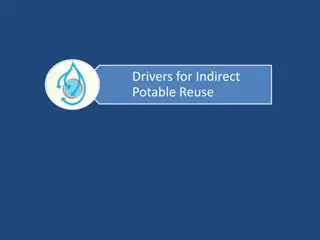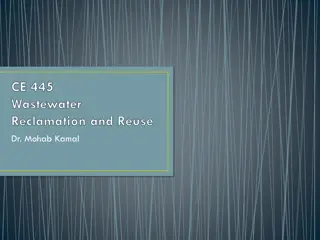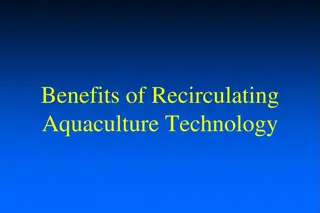Exploring Data Reuse in the Zoological Community
Preliminary findings from a project funded by the Institute for Museum and Library Services led by Drs. Ixchel Faniel and Elizabeth Yakel delve into the intersection of data reuse and digital preservation in quantitative social science, archaeology, and zoology. The research focuses on identifying the key properties of data that support reuse and how contextual information can be preserved to enable meaningful data reuse. The project targets researchers and professionals involved in managing digital information. Key aspects examined include the significant properties of different types of data and strategies for expressing these properties for preservation and reuse.
Download Presentation

Please find below an Image/Link to download the presentation.
The content on the website is provided AS IS for your information and personal use only. It may not be sold, licensed, or shared on other websites without obtaining consent from the author. Download presentation by click this link. If you encounter any issues during the download, it is possible that the publisher has removed the file from their server.
E N D
Presentation Transcript
CollectionsWeb Stakeholders Workshop, May 2-3, 2013, Washington, D.C. A Preliminary View of Data Reuse in the Zoological Community Ixchel M. Faniel, Ph.D. OCLC Research fanieli@oclc.org The world s libraries. Connected.
Institute for Museum and Library Services (IMLS) funded project led by Drs. Ixchel Faniel (PI) & Elizabeth Yakel (co-PI) Studying the intersection between data reuse and digital preservation in three academic disciplines to identify how contextual information about the data that supports reuse can best be created and preserved. Focuses on research data produced and used by quantitative social scientists, archaeologists, and zoologists. The intended audiences of this project are researchers who use secondary data and the digital curators, digital repository managers, data center staff, and others who collect, manage, and store digital information. For more information, please visit http://www.dipir.org The world s libraries. Connected.
Research Motivations & Questions 1. What are the significant properties of quantitative social science, archaeological, and zoological data that facilitate reuse? 2. How can these significant properties be expressed as representation information to ensure the preservation of meaning and enable data reuse? Faniel & Yakel 2011 The world s libraries. Connected.
The Research Team Nancy McGovern ICPSR/MIT Elizabeth Yakel University of Michigan (Co-PI) Ixchel Faniel OCLC Research (PI) DIPIR Project William Fink UM Museum of Zoology Eric Kansa Open Context The world s libraries. Connected.
Methods Overview ICPSR Open Context UMMZ Phase 1: Project Start up Interviews Staff 10 4 10 Winter 2011 Winter 2011 Spring 2011 Phase 2: Collecting and analyzing user data Interviews data consumers 44 22 27 Winter 2012 Winter 2012 Fall 2012 Survey data consumers Over 1,600 Summer 2012 Web analytics data consumers Server logs Ongoing Observations data consumers 10 Ongoing Phase 3: Mapping significant properties as representation information The world s libraries. Connected.
The Data Reusers reuse data from repositories and websites 96% reuse data from museums and archives 93% 63% are systematists 37% study ecological trends reuse data from colleagues 26% reuse data from journal articles 26% The world s libraries. Connected.
Preliminary Findings Trusting the Data The world s libraries. Connected.
Trusting the Data I can sort of qualitatively assess what the quality of taxonomic data might be just by it being, having some mention of the museum record. I know [a] museum worker who is often... I don't know about an expert in say, my group, but at least has access to the relevant literature to make goodtaxonomic decisions about those fishes from which they took the tissue. (CAU02) Or I see that the sequence has already been published and I can look at the authors, and I know that, say, so and so has published on this group before, has some experience with the fish systematics, and I can trust the taxonomic data, in other words. (CAU02) The world s libraries. Connected.
Trusting the Data let's say, in the paper or any of the papers that use that sequence Did the relationships break out Was there good support for the relationships that were described in that paper based on those sequences? And if the results are kind of wacky then maybe I'm not going to trust that sequence when I download it. (CAU02) reading through his notebooks, it became very clear, essentially, in the diary aspect of them, that he knew what he was doing some of them, through reading through them, I essentially did not fully trust the data they were collecting because they weren't... I could tell they weren't doing it quite systematically enough (CAU11) The world s libraries. Connected.
Trusting the Data A lot of times, it's just a matter of looking at what the Latin name is that they supply because I can't really make a decision based on the information that I'm given. If I had a picture, I could use that when I'm taking into account their ability to identify something. But the main way that I do it is by looking at the geography of where they claim a specimen is located. (CAU17) Well, if there's a voucher specimen available then I can request that specimen from the museum where it's housed, re-examine it, confirm or deny that it is that particular species. If the voucher's there and it's the right species, then I have to go with it. If the voucher is not there, and I really question the identification Because it's unreliable in my mind. (CAU20) The world s libraries. Connected.
Acknowledgements Institute of Museum and Library Services Partners: Nancy McGovern, Ph.D. (MIT), Eric Kansa, Ph.D. (Open Context), William Fink, Ph.D. (University of Michigan Museum of Zoology) OCLC Fellow: Julianna Barrera-Gomez Students: Adam Kriesberg, Morgan Daniels, Rebecca Frank, Jessica Schaengold, Gavin Strassel, Michele DeLia, Kathleen Fear, Mallory Hood, Molly Haig, Annelise Doll, Monique Lowe The world s libraries. Connected.
Ixchel Faniel fanieli@oclc.org Questions? The world s libraries. Connected.
